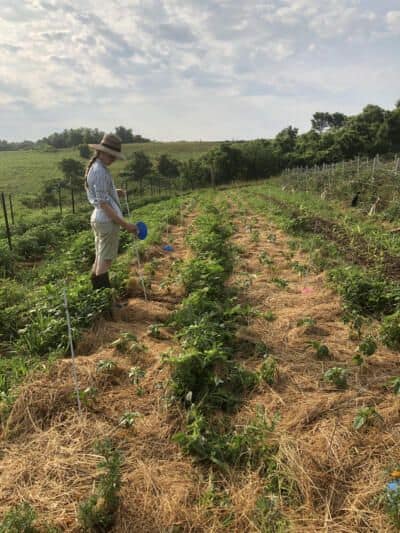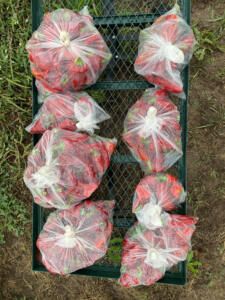Written by Mary Hathaway, OFRF’s Research & Education Program Manager

An apprentice in the pepper field at Trouvaille Farm.
In the hills of Southeastern Ohio you will find Lindsay Klaunig on her farm: Trouvaille Farm. While she has been a grower for more than 20 years, this her seventh season as owner and operator of Trouvaille Farm, something that the name itself acknowledges (Trouvaille means lucky find).
The farm landscape is a patchwork of diversity. There are grass-fed beef and goats on pasture, heirloom crops on the ridge tops and fruit trees throughout the farm. Many of the open-pollinated varieties are being grown to maturity and processed as seed crops, to be sold through small regional seed companies.
Lindsay manages the land using regenerative, organic practices and focuses on building healthy soil, and increasing biodiversity so that she can provide nutritious food for her family and neighbors. To avoid using pesticides, there are insectaries, rows of flowering plants that attract beneficial insects, throughout the farm that naturally keep pests under control.
Open Pollinated Seeds for Climate-Resilience
As a seed grower, it is important for Lindsay to have access to varieties that are regionally adapted and able to thrive in low-input systems. She sees the opportunity of open-pollinated seed varieties as a tool that is vital as the climate changes and modern hybrids may not have the same capacity to thrive in severe weather events. Seeds from open-pollinated varieties can be saved by the grower and selected for those that best meet the demands of their own particular climate, growing systems and market. This is ever more important for growers using organic systems, where farmers look to cover crops and compost for soil fertility rather than synthetic fertilizers.
In recent years, the extremes of heat and drought have been a major challenge for many of her long-season summer crops, like tomatillos and peppers. Lindsay has been interested in trying shade cloth on her peppers to help nurture them through extreme weather conditions, but she wasn’t sure if it would have a negative effect on fruit set or seed production. After learning about OFRF’s Farmer-Led Trial program, she decided this would be a relatively risk-averse way to see the impact of this growing practice on her harvest.
Farm trial plan

Plot map – legend S= shade; N= no shade
After considering some of the logistics of on-farm research trials with OFRF staff, Lindsay was able to develop a question that would help her decide if shade cloth would help, or hurt her seed harvest. The trial was further narrowed down to peppers. Research Questions: Will using shade cloth improve fruit set in pepper plants grown for seed? And if so, will that lead to early mature harvest and overall higher yields?
The trial was designed as a paired comparison with the treatments being peppers that were given 35% black netting shade cloth vs. peppers that received no shade cloth. The measurements Lindsay decided upon were to weigh the fresh fruit harvested and the fresh and dried seed weight in addition to taking basic fruit quality observations. Since she often sells her peppers for seeds, rather than as fresh fruit, this was the most helpful measurement for her production practices.
Trial updates
Harvest data is almost complete, with the first harvests beginning in late September, much later than expected due to the extreme drought conditions. Once the harvests are complete, Lindsay and the OFRF staff are excited to see the results and impact of shade cloth on pepper production.

“Every season we adjust our growing methods and try out new techniques. But inevitably the season gets busy, we lose track of outcomes and end up with incomplete impressions of what worked or didn’t. With the FLT program, I had support in designing a solid project, and funds to allow me allocate time and focus to data collection and analysis.”
– Lindsay Klaunig, Trouvaille Farm






Research Results
Lindsay Klaunig’s farmer-led trial experimented with using shade cloth to improve fruit set in pepper plants grown for seed, and examined the impact on fruit yield, seed yield and seed quality (germination rate).
Key Findings:
- Total fruit yield (Harvest 1+Harvest 2) was significantly higher in non-shaded plots, with a total yield of 10.9 lb compared to just 4.7 lb in shaded plots (Table 2). Seed yield (per plant and per bed ft) was also higher in non-shaded plots. Seed yield per lb of fresh fruit was higher in shaded plots, but this is likely due to the low fruit yield in these plots.
- There were, however, some differences between results from the two separate harvests in September and October. For example, in Harvest 1, seed yield per bed ft was not significantly different in shaded vs unshaded plots, but in Harvest 2, seed yield per bed ft was significantly higher in unshaded plots.
The season that this trial took place was one of the warmest and driest on record. The use of black shade cloth may have increased the temperature rather than provide any shade relief, as intended. In the future, Lindsay would like to try white shade cloth, and be sure to use larger hoops to allow space for more airflow over bushier crops like peppers.
For full details on the study’s methodology and results, read the final report.
This story is part of a series profiling farmers who are taking part in OFRF’s Farmer-Led Trials (FLT) program. Farmers receive technical support from OFRF to address their challenges through structured on-farm trials. To learn more about OFRF Farmer-Led Trials Program, visit our website page at https://ofrf.org/research/farmer-led-research-trials/
To learn more about bell pepper research, click the following link: Bell Pepper (Capsicum annum L.) Crop as Affected by Shade Level: Fruit Yield, Quality, and Postharvest Attributes, and Incidence of Phytophthora Blight (caused by Phytophthora capsici Leon.)
To learn more about Trouvaille Farm, visit https://www.trouvaillefarm.com/




